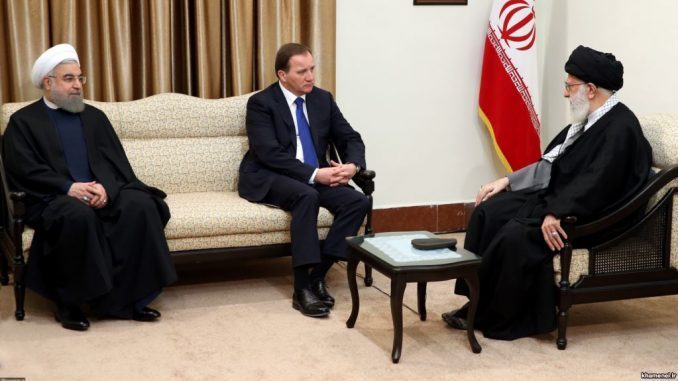
The recent visit of the Swedish government to Iran helped to bolster the economic ties between the two countries and open new channels of connections. However, this visit sparked tension in Sweden as the government was accused of changing its morals for money.
Barack Obama, The former US leader, was behind the historic Iran nuclear deal with P5+1 powers, agreed upon last year, which saw Tehran agree to amend its nuclear output in order to lift all nuclear-related economic sanctions, freeing up tens of billions of dollars in oil revenue and frozen assets.
After lifting the sanctions, Iranian president Hassan Rouhani visited Europe and made deals that worth billions of dollars. European companies started looking for investment opportunities in the growing Iranian market.
Before sanctions were imposed on Iran, the country was Stockholm’s largest trading partner, and the Sweden is keen to return to those levels.
Swedish Prime Minister Stefan Lofven was in the Iranian capital on Saturday to take part in talks addressing “economic relations and important regional problems,” he said.
The Swedish prime minister met with Iranian President Hassan Rouhani (pictured above), who hailed the “moderation” in Sweden’s foreign policy, including the government’s support of the nuclear deal reached between Tehran and several Western powers in 2015.
Rouhani said on Twitter that the two countries were determined to improve economic ties.
The visit by the Swedish premier also featured the two sides signing five documents of cooperation. The documents enabled cooperation in the areas of innovation and technology, higher education and research, road construction, communication and information technology, and family and women’s affairs.
Rouhani said, “The visit by the Swedish prime minister and a ranking delegation [to Iran] signifies the two countries’ serious will to develop bilateral ties and consult toward the reduction of tensions in the region as well as international peace and stability.” The countries are determined to have the level of bilateral ties returned to the pre-sanctions era, he said.
Rouhani also hailed Sweden’s “moderate” approach vis-à-vis Iran, which he said was maintained even when Tehran was under sanctions over its nuclear work.
Löfven, for his part, stressed the historic nature of his visit, of which he said he was “very proud.” He added that the ranking of his accompanying delegation indicated the importance his country attached to Iran and to relations with the Islamic Republic. He also announced that his visit was to be followed by several more high-level trips by Swedish officials to Iran.
One of the Swedish companies eager to do business with Iran was the transportation company Scania, which signed a deal to sell the regime 1,350 buses for public transportation in five cities.
Hailed by Khamenei
Lofven’s visit was greeted with praise from Iran’s supreme leader, Ayatollah Ali Khamenei, who hailed the positive relationship between the two countries during a meeting with the Swedish premier in Tehran.
“America and many European powers have played a role in causing traumatic events in Syria and Iraq, and the people of the region are aware of this interference and are rightly skeptical,” Khamenei was quoted as saying by Iranian television.
“Due to its long relationship with Iran, Sweden is a country with a good reputation in the eyes of our people, and the optimism of nations towards each other will be fertile ground for developing cooperation,” the supreme leader said.
Khamenei said many agreements Iran had signed with foreign countries had not been realized, however, and he expressed hope that would not also be the case with Sweden.
“We know you to be a man of action and hope you will act in a way so the accords do not just stay on paper,” Khamenei told the Swedish prime minister.
The Swedish prime minister told Swedish journalists the subject of human rights was brought up. Among the issues are the fate of Ahmadreza Djalali, a researcher at Swedish medical university Karolinska Institutet who is imprisoned in Iran and at risk of a death sentence, according to Amnesty International.
Lofven, however, gave no details on human rights issues, Swedish news agency TT reported.
Tension in Sweden
Despite these developments, tension was sparked and the Swedish governemtn was criticized heavily.
The women in the Swedish delegation all donned headscarves before meeting Rouhani, but they say they have the world’s first “feminist government,” and this movement resemble the Hijab as opression against women.
A prominent Iranian women’s rights activist and Swedish politicians have criticised the decision.
“It is ruinous to what is called a feminist foreign policy” said Liberal party chief Jan Bjorklund, who said Iran oppressed women through legislation.
The Swedish government should have requested that female members of the delegation should not have been required to wear a headscarf, he said, and that if the request were not granted any trade agreements should have been signed in Sweden or a third country.
But Trade Minister Ann Linde said that she was not willing to break Iranian law. She said that since the only other option would be to send an all-male delegation, she was required to wear a headscarf.
Masih Alinejad, an Iranian journalist and activist, posted an image of Swedish Deputy Prime Minister Isabella Lovin signing a climate bill surrounded by female colleagues earlier this month next to one of several female Swedish government officials wearing headscarves and greeting Mr Rouhani.
The image of Ms Lovin was widely seen as mocking a picture of Donald Trump signing an anti-abortion executive order surrounded by male aides and advisers.
Women in the Swedish government “should have condemned an equally unfair situation in Iran,” Ms Alinejad posted to My Stealthy Freedom, a popular Facebook page she runs that encourages Iranian women to post pictures of themselves without the hijab.
“Because if you are feminists and you care about equality then you should challenge inequality everywhere,” she told the BBC. “They must stand for their own values.”



